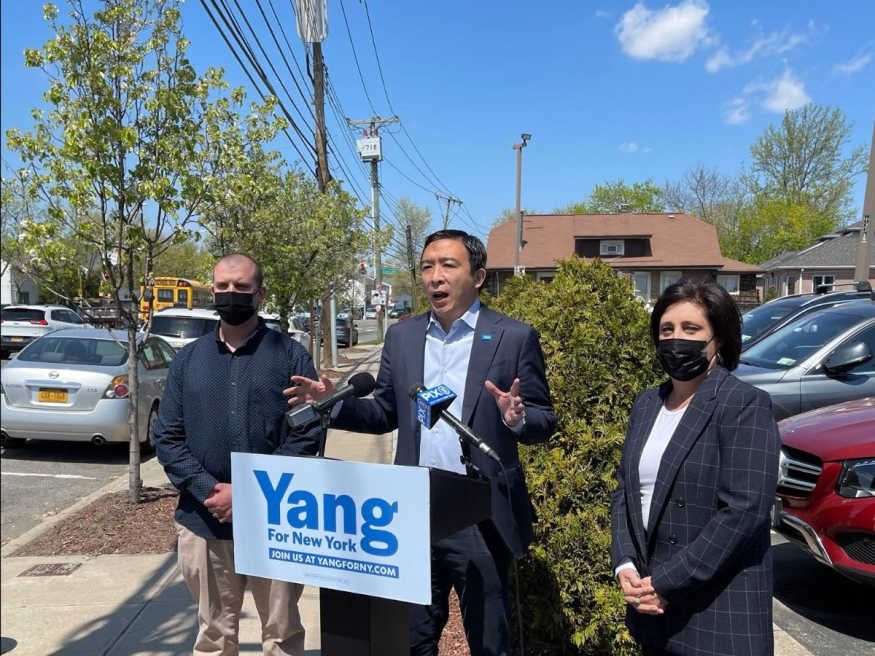Download our press kit.Includes logo, brand guidelines, photography, etc.
April 23rd, 2021
Andrew Yang Releases Opioid Policy to Treat Addiction like the Public Health Crisis It Is
**RELEASE** April 23rd, 2021
Today, Andrew Yang, Democratic candidate for Mayor of New York City, rolled out his plan to address the opioid crisis afflicting New York.
New York, NY—Recent estimates suggest that roughly 20 million American adults need treatment for a substance use disorder, and that only 10.8% are receiving the care they need. Andrew Yang understands that “Tough on Crime” and “War on Drugs” policies are not only insufficient and ineffective, but also inhumane, as they are also not helping those with addiction get the proper help they need to heal. In fact, more overdose deaths were recorded in the year ending in May 2020 than ever before.
Said Andrew Yang, “It isn’t just bad policy to approach under-treatment with over-criminalization and incarceration, it’s unjust. Addiction is not a crime nor should it be treated as crime, and locking away victims of addiction is certainly not a solution. We need to invest more resources in expanding treatment for opioid addiction through programs where we have the data that shows they work.”

A Yang administration will take a public health approach to treating addiction, expanding successful programs that replace criminalization – which only compounds the negative effects of substance abuse – with comprehensive social and medical services to put struggling New Yorkers on the path to recovery. A Yang administration will take a public health approach to treating addiction, expanding successful programs that replace criminalization – which only compounds the negative effects of substance abuse – with comprehensive social and medical services to put struggling New Yorkers on the path to recovery. As mayor, Andrew Yang will:
Advocate for the decriminalization of syringes and drug paraphernalia at the State level.
A Yang administration will lean heavily on the Democrat-controlled State Legislature to decriminalize syringe possession. Criminalization only serves to push those who are struggling with addiction away from the services they need, such as New York City’s successful syringe exchange program. Additionally, a Yang administration will direct the NYPD to focus on violent crime rather than on criminalized behaviors that don’t pose a public safety risk, especially when such behaviors have proven to be enforced disproportionately against Black and brown New Yorkers.
Expand the Heroin Overdose Prevention & Education (“HOPE”) program to every borough.
The HOPE Program launched in Staten Island in 2017 to divert those arrested for low-level substance-related crimes to treatment rather than being sent to jail. The post-arrest and pre-arraignment program allows participants to clear their arrest record by meeting with a licensed counselor at one of the programs’ designated Resource and Recovery Centers within seven days of the date of their release for an assessment, developing a service plan, and engaging in services within 37 days post-arrest.
Implement and fund Overdose Prevention Centers (OPCs) in New York City.
OPCs have been found to significantly reduce overdose deaths in surrounding neighborhoods among other public health benefits like reduced syringe sharing and increased uptake of addiction treatment, with no corresponding increase in community drug use. A Yang administration will immediately authorize the implementation of OPCs at the sites already designated by the DOH and seek to identify additional sites for OPCs where the need is greatest across all five boroughs.
Expand access to buprenorphine.
Buprenorphine is a critical component of the public health response to the opioid epidemic and a Yang administration will ensure that it is affordable and accessible to all who need it by working with NYC Health + Hospitals to increase the number of buprenorphine-prescribing doctors and incentivizing doctors to work at MAT (medication-assisted treatment) opioid abuse treatment facilities.
Build a Neighborhood Action Center in every borough and ensure they provide community-specific resources.
Neighborhood Action Centers are neighborhood-based one-stop shops that bring together health care providers, New York City agencies, and community-based organizations and programs under one roof. These vital hubs should be available in every borough and should be attuned to the needs of the communities they serve. For example on Staten Island, which has the highest overdose death rate in New York City, we will build a Neighborhood Action Center that provides addiction prevention and treatment services to patients. You can read the full plan here.
###